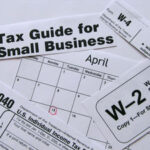California seeks to promote business by giving certain tax exemptions to resellers buying goods in the state. When a reseller buys goods for resale instead of direct company use, the reseller can obtain an exemption on the normal sales tax assessed on that purchase. However, a business must meet special requirements to obtain the benefit of this California tax exemption. First, the business must apply for and obtain a California seller permit and number. This seller permit, although not called a “resale permit” or “reseller license,” functions as a California resale permit. After obtaining the seller’s permit number from the California Board of Equalization, the business must then provide a reseller certificate to the seller of the goods meant for resale each time the business makes such a purchase.
Step 1:
The first thing a business must do is apply for the standard California seller’s permit with the California Board of Equalization (see Sources). This the first step for resellers to get a California tax exemption on the purchase of resale goods.
Step 2:
Fill out this form and the additional form for out-of-state businesses if that applies to your company (see Sources). The California seller’s permit application has some fairly detailed requirements for some applicants.
Here is an overview of what you need:
1. A copy of any partnership agreement. Of course, this applies only when the applicant is a partnership business.
2. Companies applying through the mail need to make a photocopy of each listed person’s California driver’s license. An official California ID card will also work for this requirement.
3. Include a separate list of business locations if you have multiple locations. Each California business location that sells physical products must generally have its own seller’s permit. This rule applies to applications for a “regular” seller permit. A regular permit is a permanent permit that does not expire. Conversely, a temporary permit, which uses the same application form, does not have this requirement.
Note: A temporary permit applies to businesses that seek to do business in California for 90 days or less. For example, an out-of-state business conducting a weekend seminar that sells physical products may need a temporary permit.
Of course, you need to read all of the instructions to make sure you have all the documentation necessary to get your seller’s permit.
Step 3:
Submit the form (either by mail or in person) to the closest Board of Equalization office. You may use the contact-information page for field offices on the BOE website (see Sources). You will generally receive your permit within two weeks.
Step 4:
Now, you may think you have a resale permit for California once you have your seller’s permit. This is not entirely true. Although the permit functions in part as a resale permit, it does not give you an exemption by itself. The next thing you have to do is get copies of the California resale certificate (see Sources).
Each time you buy goods that you are going to resell instead of consume in the business, you need to fill out the resale certificate and provide it to the seller. You can see on the form that you need to include your seller’s permit number. You will get this number when you receive your California sales permit from the Board of Equalization.
Conclusion: To get a California tax exemption on sales tax as a reseller, you first need to get a standard California seller’s permit. After getting the permit, you use your seller’s permit number and a new copy of the resale certificate each time you buy resale products from a wholesale provider.
Sources:
Application for California Seller’s Permit
California Resale Certificate
Additional Filing Form for Out-of-State Businesses
Directory of BOE Field Offices for Filing Permit Applications






